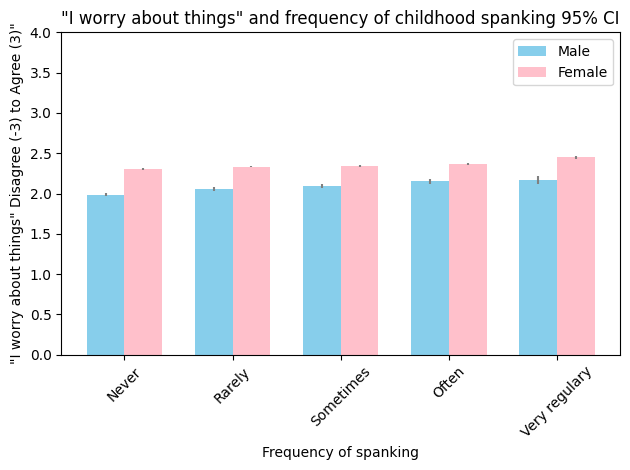In my Big Kink Survey, I asked about various bad childhood stuff. I wonder which gender gets neglected more? To help control for age and politics - both things with unequal distribution across my gender respondents - I cropped the sample down to people aged 19-26, and took only the most liberal. This was around 179,000 people.
Females’ score was 0.68 (on the 0-4 scale), while males; was 0.44. Dang, looks like girls get neglected more than boys.
What about verbal abuse?

Man, women really couldn’t catch a break here. Females’ avg rating was 0.91, and males’ was 0.6.
Okay, what about physical abuse?
Males’ score was 0.31, females 0.43. Closer, but still a bit unexpected - girls get hit around more often than boys do? Maybe boys are more often playing outdoors, with girls having indoor activities that result in closer proximity to discipline?
Speaking of discipline, let’s check spanking. That one should definitely be more boy-heavy; boys are classically more rambunctious, and studies of parents asking who they discipline more seems to show boys getting more punishment.
…Um? Here girls report being spanked more often too, with an average score of 1.36, compared to boys’ 1.23.
Are women just more likely to view their childhood as bad compared to men?
On the 7-point class spectrum (underclass=0, elite class=6), females scored 2.5 and males 2.7. This isn’t a massive difference, but the sample size is big and you can see the shift in the graph.
This one is weird. We’re looking only at the most liberal, so it’s not like we’re getting conservative and discipline-heavy girls vs. freewheeling boys.
Maybe this is an ethnicity or location imbalance? What happens if I restrict this only to white people in the US, UK, or Canada?
Keeping it to white people in English-speaking countries (or rather, UK-US-Canada) results in a 0.2 gap again, no change.
Out of curiosity, I’m gonna check young conservative people - anyone who answered “very” to “slightly” economically conservative.
(In general, I use the economically liberal-conservative scale over the socially liberal-conservative one, because the economic side seems to be slightly more predictive. In practice though, the social and economic liberalism scales are so tightly correlated it doesn’t make much difference)
The gap between males and females in conservative rankings here is still 0.2 - females 2.7, males at 2.9.
What’s going on? Is my survey somehow picking up on poorer, lower class women who get more abused compared to more upper class men with doting parents, despite my attempt to ‘control’ for politics, ethnicity and location? I asked about sibling count - that seems hard to misreport, so let’s check.
On average females report having 1.59 siblings, and males 1.56 (cohen’s d = −0.046). This is… I’m not sure how to interpret it. It’s some evidence for females legitimately being raised in poorer households (which tend to have more kids), but also maybe women are more likely to count step-siblings as siblings? The difference is super small anyway, just 0.03.
My suspicion is that to at least some degree, we might be picking up on a phenomenon where women are more likely to interpret their past negatively. Maybe narratives of abuse are more salient to women; if women are more likely to go to therapy, maybe this encourages focusing on mistreatment by parents. Possibly women are more focused on financial inequality, which makes them view the average person as more wealthy than themselves - comparing themselves to wealthier people rather than noticing poorer.
Or maybe men are just more positive? Maybe they want to view themselves as strong, unabused, more successful, so they can compete better with their peers. Unclear.
But whatever’s going on, this has made me more skeptical of people self-reporting their past experiences.
We do know that women are more neurotic than men though; they regularly score higher in questions related to neuroticism, and my survey is no exception. In the 7-point disagree-agree scale question ‘I am relaxed’, men answered 0.4 and women -0.6, a gap of an entire point. I don’t know if you know which kinds of gaps are normal but that’s a really big one. Maybe this is related somehow - if you’re more neurotic, you’re more likely to emphasize the bad things that have happened to you?
Not that this is decisive, but since I have the data let’s check neuroticism questions against childhood social class
Predictable - people raised in wealthier environments report being less worried. Unclear what direction the causality goes!
Let’s check some random other things just out of idle curiosity.
As a general reminder, the class question was
*question: Growing up, your family was
*tip: Compared to most of the people in your country
Maybe for fun let’s throw in some neuroticism x spanking graphs. I expect this to be confounded by class, or whatever mysterious confound is going on here, but including anyway.
The end. The manifold market on spanking was spicy, if you want to check out some wild trading history.

























Lots of cultures want to have at least one boy child, and might keep having children until they get one / give up, so that might help explain why women have more siblings than men?
I once dug into why the CDC report on sexual abuse had such off a deviance between yearly and lifetime abuse suffered by men. Another study shed some light: among adults that were definitely abused as children, men were something like 1/4 as likely as women to respond “yes” when asked if they were absurd as children.
My hypothesis was our culture has ready narratives of victimhood for women so women remember their abuse better. Men don’t have those narratives or at least don’t benefit from them (sympathy isn’t offered to men or is harmful) so men don’t frame their lives that way and therefore forget or at least don’t remember without being promoted with more than a label they don’t apply to themselves.
Neuroticism is a better explanation.